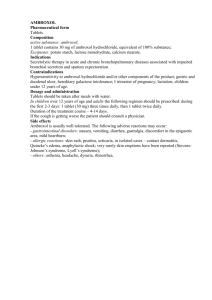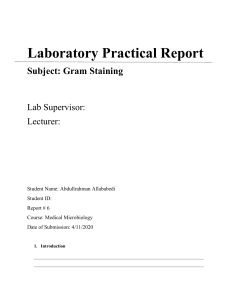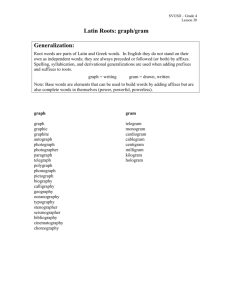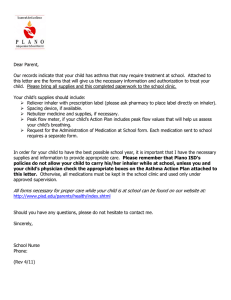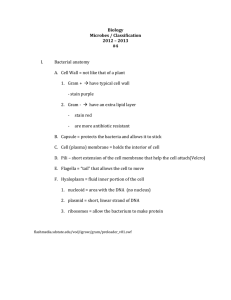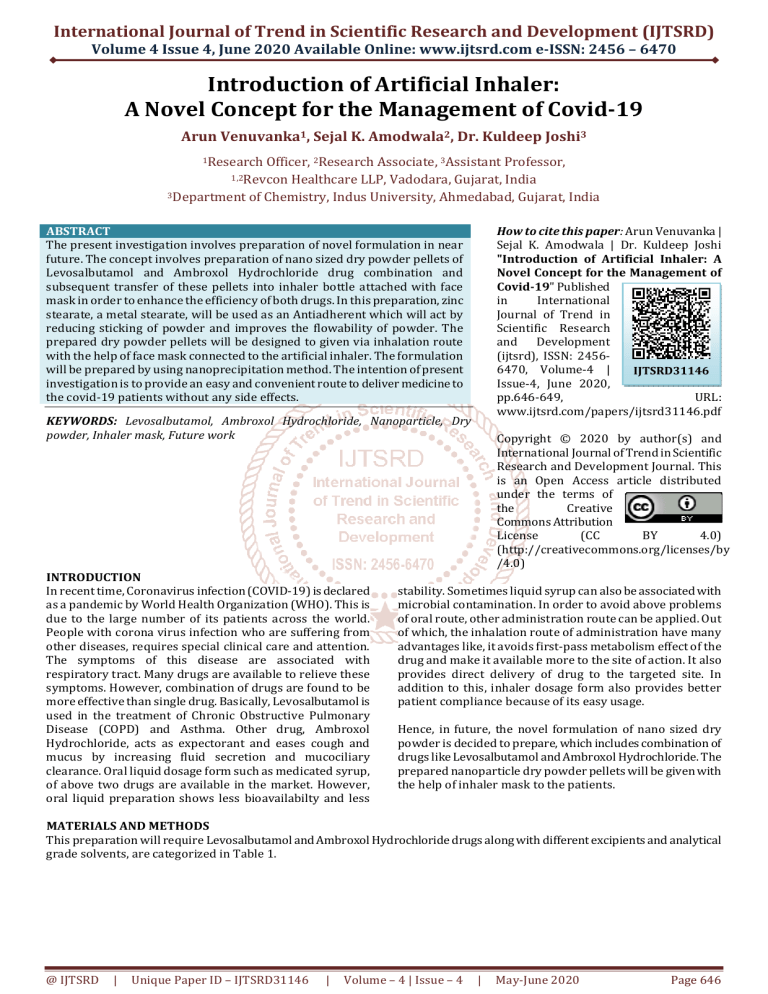
International Journal of Trend in Scientific Research and Development (IJTSRD) Volume 4 Issue 4, June 2020 Available Online: www.ijtsrd.com e-ISSN: 2456 – 6470 Introduction of Artificial Inhaler: A Novel Concept for the Management of Covid-19 Arun Venuvanka1, Sejal K. Amodwala2, Dr. Kuldeep Joshi3 1Research Officer, 2Research Associate, 3Assistant Professor, 1,2Revcon Healthcare LLP, Vadodara, Gujarat, India 3Department of Chemistry, Indus University, Ahmedabad, Gujarat, India ABSTRACT The present investigation involves preparation of novel formulation in near future. The concept involves preparation of nano sized dry powder pellets of Levosalbutamol and Ambroxol Hydrochloride drug combination and subsequent transfer of these pellets into inhaler bottle attached with face mask in order to enhance the efficiency of both drugs. In this preparation, zinc stearate, a metal stearate, will be used as an Antiadherent which will act by reducing sticking of powder and improves the flowability of powder. The prepared dry powder pellets will be designed to given via inhalation route with the help of face mask connected to the artificial inhaler. The formulation will be prepared by using nanoprecipitation method. The intention of present investigation is to provide an easy and convenient route to deliver medicine to the covid-19 patients without any side effects. How to cite this paper: Arun Venuvanka | Sejal K. Amodwala | Dr. Kuldeep Joshi "Introduction of Artificial Inhaler: A Novel Concept for the Management of Covid-19" Published in International Journal of Trend in Scientific Research and Development (ijtsrd), ISSN: 24566470, Volume-4 | IJTSRD31146 Issue-4, June 2020, pp.646-649, URL: www.ijtsrd.com/papers/ijtsrd31146.pdf KEYWORDS: Levosalbutamol, Ambroxol Hydrochloride, Nanoparticle, Dry powder, Inhaler mask, Future work INTRODUCTION In recent time, Coronavirus infection (COVID-19) is declared as a pandemic by World Health Organization (WHO). This is due to the large number of its patients across the world. People with corona virus infection who are suffering from other diseases, requires special clinical care and attention. The symptoms of this disease are associated with respiratory tract. Many drugs are available to relieve these symptoms. However, combination of drugs are found to be more effective than single drug. Basically, Levosalbutamol is used in the treatment of Chronic Obstructive Pulmonary Disease (COPD) and Asthma. Other drug, Ambroxol Hydrochloride, acts as expectorant and eases cough and mucus by increasing fluid secretion and mucociliary clearance. Oral liquid dosage form such as medicated syrup, of above two drugs are available in the market. However, oral liquid preparation shows less bioavailabilty and less Copyright © 2020 by author(s) and International Journal of Trend in Scientific Research and Development Journal. This is an Open Access article distributed under the terms of the Creative Commons Attribution License (CC BY 4.0) (http://creativecommons.org/licenses/by /4.0) stability. Sometimes liquid syrup can also be associated with microbial contamination. In order to avoid above problems of oral route, other administration route can be applied. Out of which, the inhalation route of administration have many advantages like, it avoids first-pass metabolism effect of the drug and make it available more to the site of action. It also provides direct delivery of drug to the targeted site. In addition to this, inhaler dosage form also provides better patient compliance because of its easy usage. Hence, in future, the novel formulation of nano sized dry powder is decided to prepare, which includes combination of drugs like Levosalbutamol and Ambroxol Hydrochloride. The prepared nanoparticle dry powder pellets will be given with the help of inhaler mask to the patients. MATERIALS AND METHODS This preparation will require Levosalbutamol and Ambroxol Hydrochloride drugs along with different excipients and analytical grade solvents, are categorized in Table 1. @ IJTSRD | Unique Paper ID – IJTSRD31146 | Volume – 4 | Issue – 4 | May-June 2020 Page 646 International Journal of Trend in Scientific Research and Development (IJTSRD) @ www.ijtsrd.com eISSN: 2456-6470 Table 1: Category of drug and other ingredients used for nanoparticle preparation Name of Raw Materials Category Levosalbutamol Drug/short-acting β2 adrenergic receptor agonist Ambroxol Hydrochloride Drug / secretolytic agent Hydroxy Propyl Methyl Cellulose (HPMC 5 cps) Bioadhesive Polymer/ Gelling agent Tween 80 Surfactant/ Solubilizer Purified water Solvent/Vehicle Diethyl ether Solvent Span 80 Lipophilic surfactant Mannitol Stabilizer/ Carrier Leucine Moisture absorbing agent / Stabilizer Zinc stearate Antiadherent/ Coating agent/Antifriction agent Sr. No. 1 2 3 4 5 6 7 8 9 10 PREPARATION OF NANOPARTICLE The formulation will be prepared by using Hydroxy Propyl Methyl Cellulose (5 cps) polymer. The concentration of Hydroxy Propyl Methyl Cellulose will be optimized by preliminary experimentation in which blank nanoparticles will be prepared using varying concentrations of polymers. The concentrations which yielded maximum drug content having desirable particle size will be selected for preparing drug loaded nanoparticles. Formulation composition is described in Table 2, whereas different polymer and solvent ratio for different batches are described in Table 3. Drug loaded polymeric nanoparticles will be prepared by nanoprecipitation method. Particle size of drug and other materials should be less than 5 µm. If necessary, powder milling process will be performed to achieve this desirable particle size. The following solutions will be made separately : Solution A, Polymer solution will be prepare by dissolving Hydroxy Propyl Methyl Cellulose (5 cps) and Tween 80 in small amount of purified water followed by using homogenizer for 5 minutes at 3000 rpm. Solution B, 0.04 % w/w and 24 % w/w drug solution will be prepare by dissolving Levosalbutamol and Ambroxol Hydrochloride in 50 gram weight of purified water. This aqueous drug solution B will be added dropwise into Polymeric solution A using a high speed homogenizer. Solution C will contain Diethyl Ether and Span 80. This solution C will be dropwise added in previously prepared Drug and HPMC solution using a homogenizer at 10,000 rpm for 5 minutes. This prepared solution will pass through the high pressure microfluidizer for three passes at 12000 psi to make Nanoformulation. After that, nano spray drying process will be performed to convert these nanoparticles into dry powders. In this process, Mannitol (carrier), Leucine and Zinc stearate will be used. After in-process studies, 1 gram nano sized dry powder pellets will incorporated into 1 ml capacity of small inhaler bottle previously attached with face mask as shown in Figure 1. The spray bottle containing nano sized dry pellets, will be fabricated with lock system in order to provide an accurate dose. Figure 1: Inhaler bottle with flow mechanisam Sr. No. 1 2 3 4 5 6 7 8 9 10 @ IJTSRD | Table 2: Different Formulation composition for Nanoparticle Preparation Quantity/ Gram Name of Raw Materials Quantity/ 100 gram* 0.2 mg Levosalbutamol IP 0.02 gram 120 mg Ambroxol Hydrochloride IP 12 gram --Hydroxy Propyl Methyl Cellulose (HPMC 5 cps) IP Vary --Tween 80 IP 0.1 gram q.s. Purified water IP 100 gram --Diethyl ether IP Vary --Span 80 IP Vary --Mannitol IP 1 gram --Leucine IP 0.2 gram --Zinc stearate IP 2 gram Unique Paper ID – IJTSRD31146 | Volume – 4 | Issue – 4 | May-June 2020 Page 647 International Journal of Trend in Scientific Research and Development (IJTSRD) @ www.ijtsrd.com eISSN: 2456-6470 Table 3: Concentrations of HPMC, Diethyl Ether and Span 80 for different Batch Batch Code Name of Ingredients Quantity/ Gram Quantity/ 100 grams* Hydroxy Propyl Methyl Cellulose 5 mg 0.5 gram (HPMC- 5 cps) IP B1 Diethyl Ether IP 0.006 ml 0.6 ml Span 80 IP 0.06 mg 0.006 gram B2 Hydroxy Propyl Methyl Cellulose (HPMC- 5 cps) IP Diethyl Ether IP Span 80 IP 10 mg 1 gram 0.009 ml 0.09 mg 0.9 ml 0.009 gram Hydroxy Propyl Methyl Cellulose 2 mg 0.2 gram (HPMC- 5 cps) IP B3 Diethyl Ether IP 0.003 ml 0.3 ml Span 80 IP 0.03 mg 0.003 gram Note: In all batches, concentration of both drugs and other ingredients will be same as table 2. FABRICATION OF ARTIFICIAL INHALER MASK The artificial inhaler mask will be fabricated in three different layers as shown Figure 2. The prepared sample will be transferred into small HDPE bottle. The sample bottle container will be designed to have a lock and key system, which will allow to provide an accurate inhaler dose. The sample container will be connected to mask. Artificial oxygen ventilator layer of mask will improve oxygen flow and ventilation in infected patients. Figure 2: Artificial Inhaler mask design EVALUATION PARAMETERS The prepared product will be evaluated for various parameters, as listed below. 1. Surface Morphology : Prepared formulation will be evaluated for its appearance, colour and order. 2. Particle size analysis : The prepared dry pellets will be analyzed for particle size using electron microscopy. 3. Powder flow properties and porosity 4. Entrapment efficiency 5. Drug content (Assay) 6. Stability studies of dry powder pellets with and without packing 7. Microbial studies and Spray pattern by dye-talc mixture FUTURE WORK PLAN After obtaining satisfactory results of initial phase, the prepared product will be tested further for different in-vitro and in-vivo parameters. This involves clinical trial test and stability studies. @ IJTSRD | Unique Paper ID – IJTSRD31146 | PROPOSED RESULT AND DISCUSSION The proposal of present investigation involves preparation of novel formulation containing an effective drug combination of Levosalbutamol and Ambroxol Hydrochloride, in order to reduce the infection associated with covid-19, a novel corona virus. The selection of polymer will be optimized on the basis of preliminary experimentation and literature survey. The main characteristics required will be, proper drug effect, easy usage and patient comfort. The method used to prepare nanoparticle, is well established and non-complicated, which involves the usage of easily available raw materials and solvents. The prepared nano pellets will suppose to have good flowability, easy handling and desirable effect on patients. Volume – 4 | Issue – 4 | May-June 2020 Page 648 International Journal of Trend in Scientific Research and Development (IJTSRD) @ www.ijtsrd.com eISSN: 2456-6470 REFERENCE [1] www.who.int/ World Health Organization [2] [5] www.drugbank.ca/Ambroxol [6] https://www.ncbi.nlm.nih.gov/pubmed/16185366 www.pbs.gov.au/info/reviews/asthma-childrensubmissions/asthma-children-submission-12 [3] http://article.sciencepublishinggroup.com/html/10.11 648.j.ajcem.20150306.18 [4] https://www.hindawi.com/journals/jdd/2018/56350 10 @ IJTSRD | Unique Paper ID – IJTSRD31146 | [7] The Mechanics of Inhaled Pharmaceutical Aerosols; 1st Edition; Elsevier [8] Dry powder inhaler performance of spray dried mannitol with tailored surface morphologies as carrier and salbutamol sulphate; Elsevier Volume – 4 | Issue – 4 | May-June 2020 Page 649
